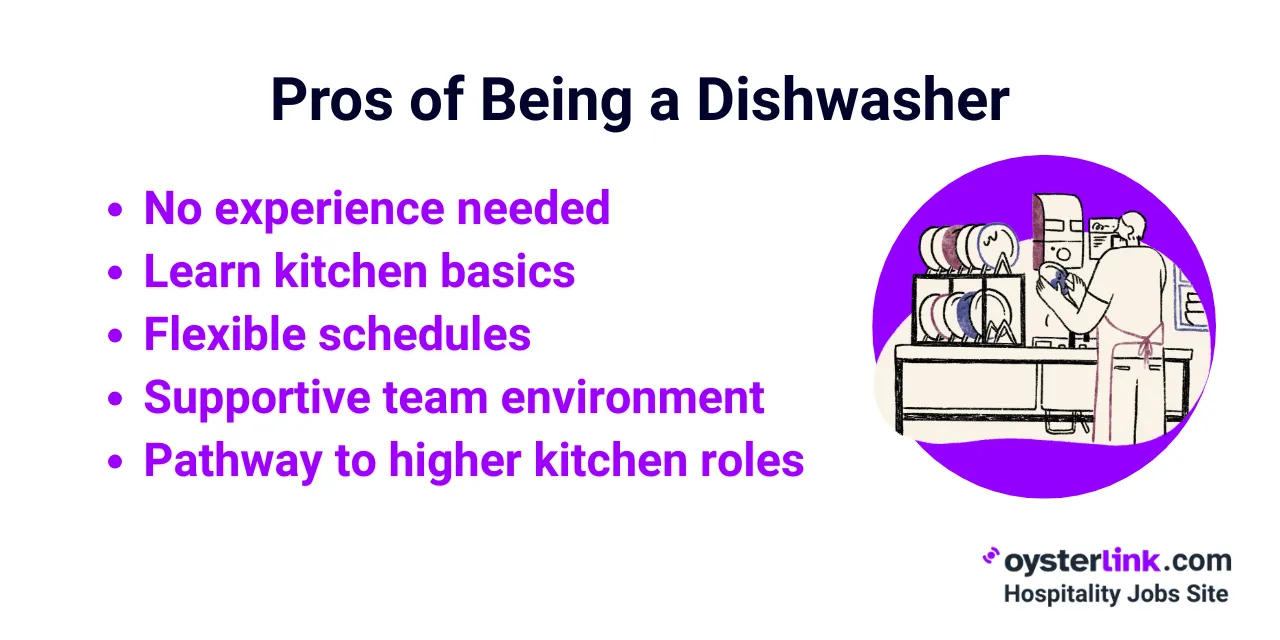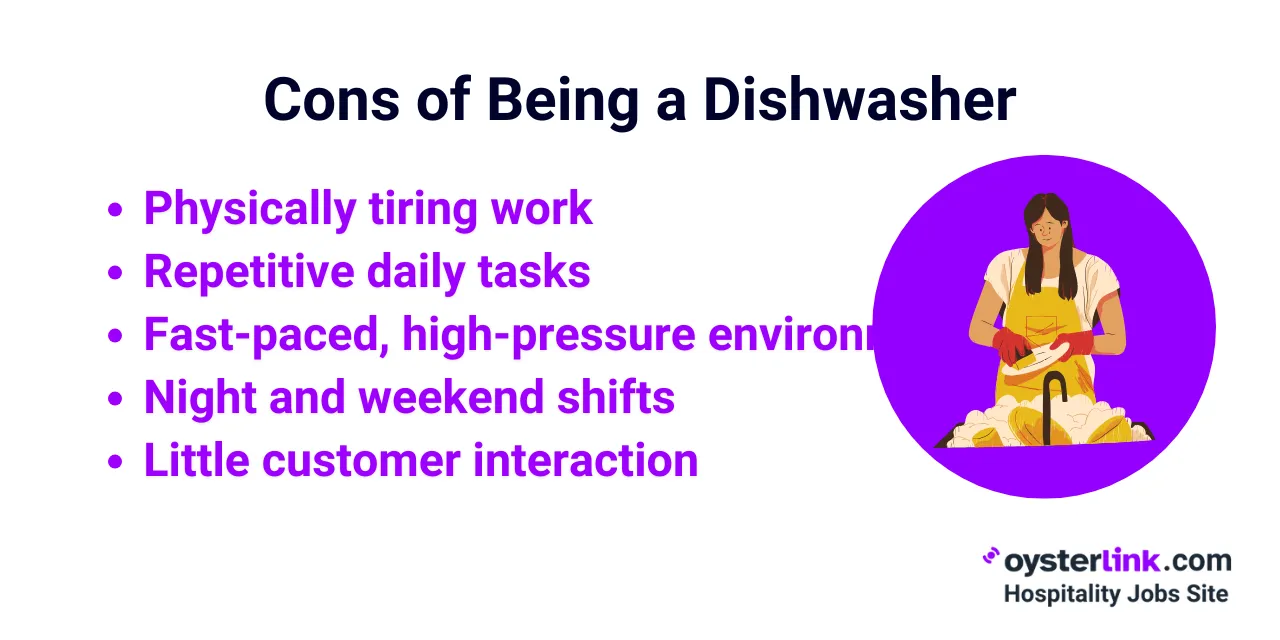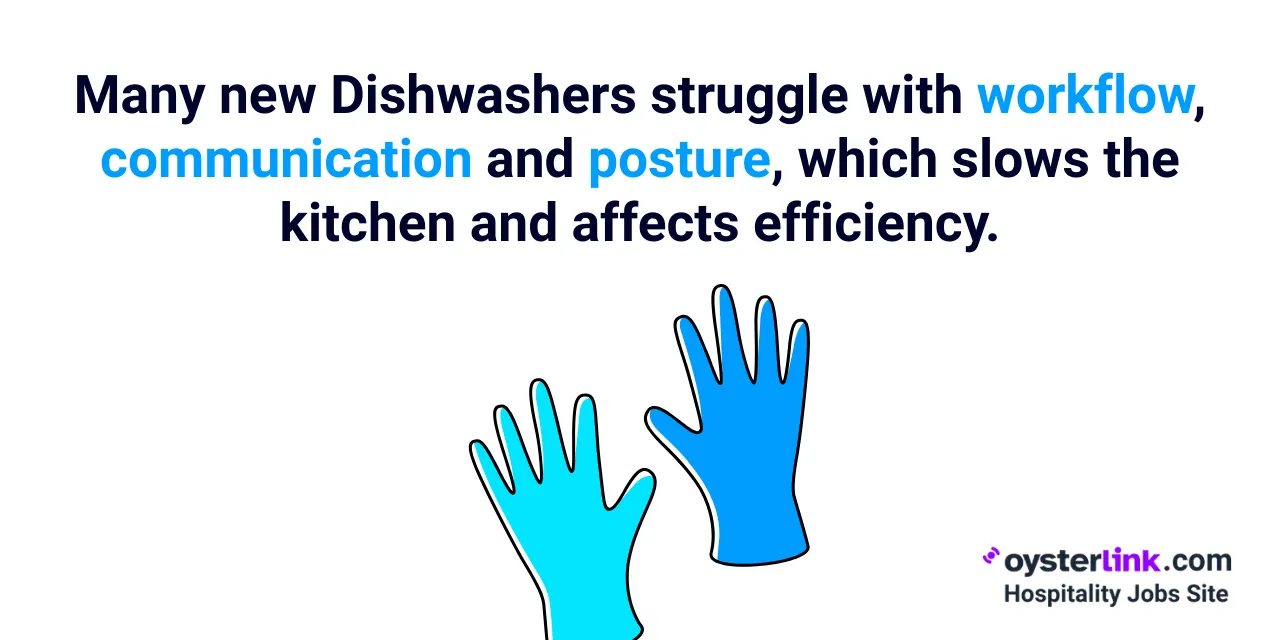A Dishwasher plays a crucial role in the smooth functioning of any restaurant or hospitality establishment. More than just washing plates and utensils, Dishwashers ensure hygiene standards are met and support the entire kitchen team.
If you’re considering a job in the restaurant industry or looking for an entry-level position, understanding the pros and cons of being a Dishwasher can help you determine if this path is right for you.
Pros of Being a Dishwasher
Below, we’ll break down some of the main advantages of working as a Dishwasher, focusing on how this role can serve as a foundational entry point into the broader hospitality world.

1. Accessible entry-level position
Most kitchens are open to hiring Dishwashers with little or no prior experience. This makes it an ideal first job for individuals looking to step into the workforce, especially within the culinary or hospitality sectors.
2. Opportunities to learn about kitchen operations
Working as a Dishwasher exposes you to the fast-paced environment of a restaurant kitchen. Over time, you’ll pick up on best practices, safety standards and even cooking techniques by observing the Chefs and Line Cooks.
3. Potential for flexible scheduling
Restaurants often offer part-time and weekend shifts, making it easier to balance work with school or other responsibilities. If you have commitments outside of work, this flexibility can be a significant advantage.
4. Team-focused environment
Dishwashers typically work closely with other kitchen staff. This collaborative setting can foster camaraderie and help you build strong professional relationships. Being part of a supportive team environment can also make even the busiest shifts feel more manageable.
5. Stepping stone to other roles
Many people start as Dishwashers and eventually move on to roles like Prep Cook, Line Cook, or even Sous Chef. If you’re aiming for a long-term career in the restaurant industry, this entry-level position can provide the foundation you need to grow.
Cons of Being a Dishwasher
Before deciding on this path, it’s essential to understand some of the drawbacks, from physical demands to potentially repetitive work.

1. Physically demanding tasks
Constantly standing, bending, and lifting can take a toll on your body, especially during peak service times. Carrying racks of dishes or large cookware may lead to fatigue if you’re not prepared for the physical aspect.
2. Repetitive, routine work
Dishwashing can be monotonous. Washing, drying and organizing the same types of dishes and utensils can become tedious over time, particularly if you prefer variety in your daily tasks.
3. High-pressure kitchen environment
Restaurants often get chaotic during rush hours. Dishwashers are expected to keep up with the fast pace, ensuring the kitchen never runs out of clean plates or utensils. This can be stressful if you’re not comfortable working under pressure.
4. Often involves night and weekend shifts
Most restaurants see their busiest times on weekends and evenings, meaning Dishwashers often work during these hours. This schedule might interfere with personal plans and social activities.
5. Limited customer interaction
If you thrive on social connections, you may find the back-of-house role isolating. While some Dishwashers do interact with the front-of-house staff, direct customer engagement is typically minimal.
Common Mistakes for New Dishwashers
Many new Dishwashers overlook proper workflow which slows down the entire kitchen.

Skipping steps like sorting dishes, pre-rinsing or organizing racks often leads to bottlenecks during rush periods.
Another common mistake is poor posture — standing incorrectly or lifting trays the wrong way can cause fatigue or minor injuries over time. New hires may also hesitate to communicate assuming they shouldn’t speak up.
In reality, staying in sync with Cooks and Servers keeps the operation running smoothly. By asking questions early, maintaining good habits and following a consistent routine, beginners can quickly improve their speed and accuracy.
Skills & Traits Successful Dishwashers Have
This video provides a closer look at what it really takes to be effective in this role, following Drevon “Dre” Alston — the Dishwasher at one of Brooklyn’s oldest restaurants — as he moves nonstop through his shift:
Working behind the scenes to keep the operation running smoothly, Dre shows how demanding and essential the job can be, from washing nonstop trays of dishes to shuttling them across multiple floors.
Successful Dishwashers usually share core traits that help them thrive in fast-paced kitchen environments.
Physical stamina is essential especially during peak service when dishes pile up quickly. Attention to detail also matters — catching food residue properly stacking items and monitoring machine cycles ensures clean safe dishware for guests.
Reliability is another key trait since restaurants depend on Dishwashers to keep the kitchen moving without delays. Teamwork rounds out the list since coordination with Cooks Servers and Bussers helps maintain an efficient workflow.
These skills not only support daily performance but also pave the way for advancement into Prep Cook or Line Cook roles.
Is Being a Dishwasher Worth It?
This short video offers a clear look at the pace and responsibilities of a Dishwasher:
It highlights both the routine nature of the job and the teamwork involved.
Ultimately, the value of working as a Dishwasher depends on your goals. If you’re looking for an accessible entry-level job that provides insight into the restaurant industry and you don’t mind physically demanding work, this can be an excellent starting point.
However, if you prefer more variety in your daily tasks or need a conventional schedule, the challenges may outweigh the benefits.
Pros & Cons of Being a Dishwasher: Conclusion
In summary, being a Dishwasher offers a practical entry point into the hospitality world: it’s accessible, often requires minimal experience and gives you a firsthand look at kitchen operations while offering flexible scheduling.
For people eager to learn the ropes, build a work ethic, and potentially climb to cooking or kitchen-staff roles, it can be a smart starting position.
That said, the job’s physical demands, repetitive tasks, and irregular hours aren’t for everyone.
If you value variety, work-life balance, or customer interaction, you might want to consider other paths. Ultimately, the decision depends on your personal priorities — but for many, the Dishwasher role remains a solid first step into restaurant work.











Loading comments...